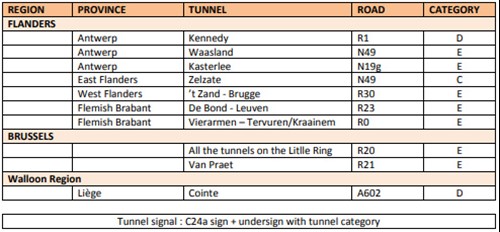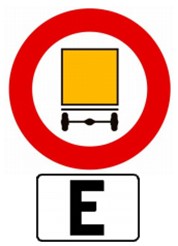Road Transport Operations Belgium
Belgium is one of the smallest and most densely populated European countries, and it has been, since its independence in 1830. The country has a total of 860 miles (1,385 km) of land boundaries with it's neighbours; it is bounded by the Netherlands to the north, Germany to the east, Luxembourg to the southeast, and France to the south. Belgium also has some 40 miles (60 km) of shoreline on the North Sea.
Cabotage
UK hauliers may carry goods to, through or from the country. Goods can also be carried from Belgium to a third country and vice versa if permitted by the terms of any agreement between the three countries. Cabotage is permitted. EU member state vehicles undertaking cabotage must use the Belgium National consignment note (CMR).
Dangerous Goods
Belgium is a party to the ADR agreement, however specific rules apply as follows:
- Vehicles bearing an Orange ADR plate must travel on motorways. However, there is the exception to this where circumstances allow
- Other ADR goods carrying vehicles must not travel on roads or through tunnels showing the C24 road sign (see image right)
ADR Movements through tunnels
|
ADR Tunnel Codes came into effect 1 January 2010. All dangerous goods notes (DGN's) must have the Tunnel Code included. There are five categories of tunnel categorisation for ADR, with A representing the least restrictive through to E being the most restrictive. If a vehicle is carrying ADR goods, it is important to know which tunnel to use. An example for Belgium is the Waasland Tunnel at Antwerp which has Tunnel Code E. However, there are many tunnels throughout the country so routes must be planned well if a vehicle is carrying ADR. |
|
TUNNEL RESTRICTIONS ACCORDING TO ADR 1.9.5 - BELGIUM

Abnormal Loads
Abnormal load movements are prohibited on public holidays and on ordinary roads, from Saturdays at 06.00 hours until Mondays at 06.00 hours and also on motorways, from Saturdays at 06.00 hours until Mondays at 09.00 hours.
Special authorisation must be obtained if vehicles/loads exceed maximum permitted weights and dimensions. For help and assistance, visit the Royal Belgian Federation of carriers and logistics providers’ website https://febetra.be/
All abnormal load operators will require a keeper’s certificate to prove ownership of the trailer which must be carried as part of the vehicle documents at all times.
An application form can be downloaded below:
Taxation fuel carried into Belgium in the main tank is duty-free.
Customs
All goods carried into Belgium are in free circulation (except excise duty goods) from all operators of EU member states. TIR Carnets are accepted. ATA Carnets are accepted for specific temporary imports from Non-EU countries. CMR notes are compulsory and must be completed correctly otherwise heavy fines can be imposed.
Movement Restrictions
There are no driving restrictions on public holidays or weekends.
Overtaking Bans
In Belgium, new regulations on overtaking by trucks have been in force since the beginning of 2019. They are similar to those that have long been introduced by other European countries. Also, special cameras will catch drivers who break the ban on overtaking in the rain.
By the end of 2018, trucks were not allowed to overtake on Belgian motorways with two lanes in one direction. This manoeuvre was possible on sections marked appropriately with a blue sign. From 2019, lorries were allowed to overtake on these roads, unless a sign prohibiting overtaking for trucks is in place, similar to other European Union countries.
Road Tolls
Since April 1, 2016, a new toll system has been in operation in Belgium. Every commercial vehicle over 3.5 tonnes must be equipped with a satellite box called OBU (On-Board Unit). It replaces the Eurovignette in Belgium for trucks over 12 tonnes.
The OBU counts the kilometres travelled and records the routes trucks take.
This new system applies on the Belgian highways and some of the country’s major roads covering a total of more than 6,800 km.
To download the toll maps applicable, visit Viapass website
Rates (€/km) vary according to four criteria:
- Weight
- Type of road
- Euroclass
- Kilometres covered
Bridge and Tunnel Tolls
The Liefkenshoek Tunnel is situated just north of Antwerp within the Antwerp ring, it operates debit, credit, fuel cards and OBU facilities. For more information about the Tunnel, its closure periods and current charges, please click on the link below which connects directly to the Liefkenshoek Tunnel website.
Liefkenshoek Tunnel Connects N49 (B) to A12 (NL) - Situated North of Antwerp
Liefkenshoek Tunnel
Abnormal loads can travel through the tunnel but must conform to the height policy, it is, therefore advisable to check before arriving. All abnormal loads travel in lane 1 only.
Vehicle Legal Documentation
- Green Card required, plus original vehicle registration docs.
- A GB plate must be fitted to the rear of the vehicle/trailer.
- A Trailer Registration Certificate is a requirement. To register for a trailer certificate visit https://www.gov.uk/register-trailer-to-take-abroad
Loads & Load Safety
More and more EU member states are implementing Load Safety Best Practice and penalising operators/drivers for failure to implement. The guide can be downloaded from the EU commissions website here European Guidelines on Cargo Security/Load Safety. More information is found on the Load Security page within the Construction & Use/Loads section of this website.
Safety Equipment
In the best interest of road safety the following compulsory safety equipment or requirements and advice should be adhered to:
- A warning triangle, which in the event of a breakdown, should be placed 30 metres behind the vehicle on roads other than motorways. On motorways, it is 100 metres
- Seat belts must be worn at all times
- Reflective jackets must be worn (day or night) if the driver leaves the cab in the event of an accident or breakdown
- Dipped headlights in adverse weather conditions or restricted visibility
- First Aid Kit
- Fire Extinguisher
- It is forbidden to smoke in vehicle cabs
- The use of snow chains is advisable in snow/icy conditions
- The minimum tyre tread depth is 1.6mm
Driver Legal Documents
- Full passport required but no visa.
- Full UK (card) licence or International driving permit
- A letter from employer giving driver permission to drive vehicle,
- Attestation letter and form if there are missing tachograph charts from the current period and full explanation.
If the UK fully leaves the EU on 31 January 2021, HGV drivers will require travel insurance with healthcare cover
The following links provide guidance and further information
British Embassy
Avenue d’Auderghem 10, 1040 Brussels, Belgium
Tel: +32 (2) 287 6211
Web: https://www.gov.uk/world/organisations/british-embassy-brussels
Transport Organisation
Febetra Nationaal
Stapelhuisstraat 5a
1020 Brussels
Tel: +32 (0)2 425 68 00
Web: http://www.febetra.be/
